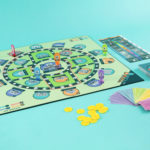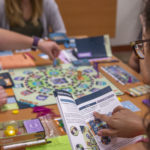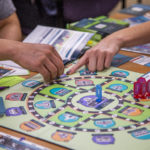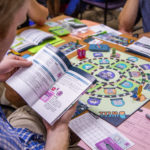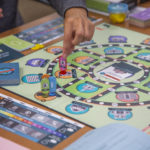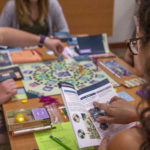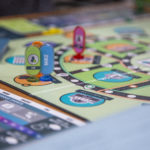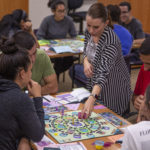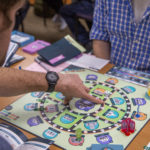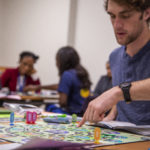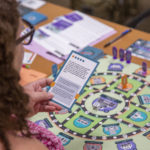Dwell™ is a tabletop simulation game to teach about poverty’s impact on one’s choices, health, livelihood, communities, and families. The game was created by an interdisciplinary team led by faculty from the University of Miami’s
School of Communication and
School of Nursing and Health Studies (SONHS). In the game, players roleplay as a provided character who must support and care for themselves and possibly an entire household.
Dwell™ is primarily intended to be a facilitated game, particularly when played by multiple sets of players concurrently, as a curriculum module or part of a workshop.
By the end of the game, players should be able to:
- Discuss how poverty impacts health, healthcare choices, and healthcare access
- List new facts and statistics about how poverty impacts people
- Apply greater empathy when caring for others who are economically disadvantaged
- Begin developing new strategies to help educate and connect economically disadvantaged people with community resources
Dwell™ accomplishes these objectives as a roleplaying game in which players navigate Dwellville over the course of a simulated month, one week at a time, as one of 5 characters trying to meet their long- and short- term goals. In addition to living in Dwellville as one of its residents, players participate in regular “reflections” (at the end of each in-game week on “Saturday”) during which they are encouraged to talk as their game character (in the first person) with the other players at their table about their experiences during the simulated week of play: what were the successes and challenges, how are they planning to meet their goals in the next week, etc. In addition to reflections, players select a category and share a did-you-know statistic or fact on “Sunday” from an online fact library and then talk about how it pertains to their in-game experience. Finally at the end of the game, players participate in a larger debrief that allows them to talk about and compare their extended experiences as each character. Additionally, players are asked to reflect upon and share how this experience may change future interactions with people who are economically disadvantaged.
Given the importance of educating future professionals in the fields of healthcare and other education about the implications of poverty, the
Dwell team’s goal was to create a game with an educational impact that does not require long setup time or a significant amount of human capital to run the event, especially in comparison to similar tools currently used for health education.
Awards
- Runner-up award in the Best in Show, Academic Games category; 2019 International Meeting for Simulation in Healthcare (IMSH)’s SimVentors Showcase, Games Arcade
Funding
- Co-Principal Investigator with Jill Sanko, Deborah Salani and Yui Matsuda on “Dwell: An Interactive Tabletop Simulation Game Teaching How Poverty Impacts Health and Healthcare Access” funded by Center for Communication, Culture, and Change (4C), University of Miami, June 2017 – December 2018, $5,000
Related Press
- Gutierrez, B. (2018, October.) ‘Dwell’ tabletop game shows students daily struggles of poverty. Retrieved from https://news.miami.edu/stories/2018/10/dwell-shows-students-daily-struggle-of-poverty.html | Link
Exhibitions
- Tran, L., Sanko & J. Salani, D. (2019, January). Dwell. Game exhibited at International Meeting for Simulation in Healthcare conference in the SimVentor’s Games Arcade, San Antonio, TX. |PDF
- Tran, L., Sanko & J. Salani, D. (2018, October). Dwell. Game exhibited at Meaningful Play, East Lansing, MI. | Link






